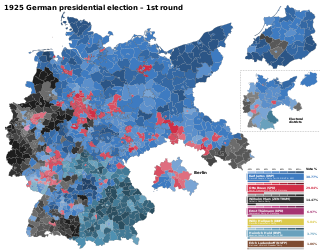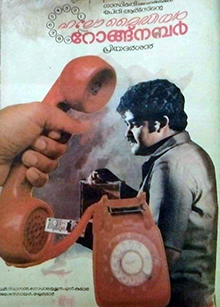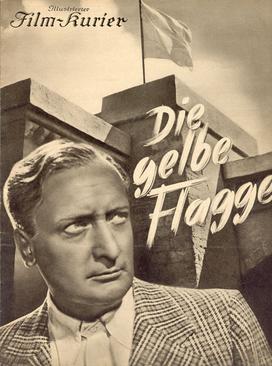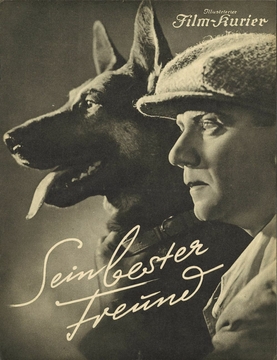
Karl Wolfskehl was a German Jewish author and translator. He wrote poetry, prose and drama in German, and translated from French, English, Italian, Hebrew, Latin and Old/Middle High German into German.

Presidential elections were held in Germany on 29 March 1925, with a runoff on 26 April. They were the first direct elections to the office of President of the Reich, Germany's head of state during the 1919–33 Weimar Republic. The first President, Friedrich Ebert, who had died on 28 February 1925, had been elected indirectly, by the National Assembly, but the Weimar Constitution required that his successor be elected by the "whole German people". Paul von Hindenburg was elected as the second president of Germany in the second round of voting.

Annemarie Renger was a German politician for the Social Democratic Party of Germany (SPD).

Hello My Dear Wrong Number is a 1986 Indian Malayalam-language comedy thriller film directed by Priyadarshan and written by Sreenivasan from a story by Priyadarshan. It was inspired from North By Northwest directed by Alfred Hitchcock.stars Mohanlal, Maniyanpilla Raju, Jagathy Sreekumar, Lissy and Menaka, with Mukesh in a guest appearance.

Karl Bernhard Fritz Schröder was a communist politician and writer.

Cliff Jordan is an album by American jazz saxophonist Clifford Jordan recorded on June 2, 1957 and released on Blue Note later that year. The septet features horn section Lee Morgan, Curtis Fuller and John Jenkins, and rhythm section Ray Bryant, Paul Chambers and Art Taylor.

Sonja Sutter was a German film actress. She was one of the few actors that was allowed to appear in productions in both East and West Germany. She is remembered for her role as Fraulein Rottenmeier in the German TV series Heidi from 1978. This series aired in many countries in Europe during the 1980s and 1990s, and was dubbed into several languages. She is also remembered for having had several roles in the TV series Derrick from 1983 to 1998.

Tannenberg is a 1932 Swiss–German war film directed by Heinz Paul and starring Hans Stüwe, Käthe Haack and Jutta Sauer. The film is based on the 1914 Battle of Tannenberg during the First World War. It focuses on a German landowner Captan von Arndt and his family.
Gerhard Max Richard Bienert was a German stage and film actor.

By a Silken Thread is a 1938 German drama film directed by Robert A. Stemmle and starring Willy Fritsch, Carl Kuhlmann and Käthe von Nagy. The film was intended to be an exposure of "crooked Jewish capitalists" in line with Nazi racial policy of the era. It was shot at the Babelsberg Studios of UFA in Potsdam. The film's sets were designed by the art director Otto Hunte.

The Yellow Flag is a 1937 German drama film directed by Gerhard Lamprecht and starring Hans Albers, Olga Chekhova and Dorothea Wieck. It was shot at the Babelsberg Studios in Berlin. The film's sets were designed by the art director Ludwig Reiber. Location filming took place in Yugoslavia.

The Unfaithful Eckehart is a 1931 German comedy film directed by Carl Boese and starring Ralph Arthur Roberts, Fritz Schulz and Paul Hörbiger. The film is based on the play of the same title by Hans Stürm. It was remade in 1940. A silent film was made by Reinhold Schünzel in 1928 under the title Don Juan in a Girls' School.

The Soaring Maiden is a 1931 German comedy film directed by Carl Boese and starring Lissy Arna, S.Z. Sakall and Dina Gralla. It was shot at the Halensee Studios in Berlin. The film's sets were designed by the art director Franz Schroedter.

His Best Friend is a 1937 German crime film directed by and starring Harry Piel. It also features Edna Greyff, Henry Lorenzen and Lissy Arna. It was shot at the Johannisthal Studios in Berlin. The film's sets were designed by the art directors Karl Weber and Erich Zander. Piel had previously starred in a 1929 film of the same title.

Artists' Blood is a 1949 West German comedy film directed by Wolfgang Wehrum and starring Hans Richter, Dorit Kreysler and Fritz Odemar. It was shot at the Wandsbek Studios in Hamburg and on location in mountain resort town of Garmisch-Partenkirchen. The film's sets were designed by the art directors Kurt Herlth and Carl Ludwig Kirmse.

Arlette Conquers Paris is a 1953 West German comedy film directed by Viktor Tourjansky and starring Johanna Matz, Karlheinz Böhm and Claus Biederstaedt. It was shot at the Babelsberg Studios and on location in Paris. The film's sets were designed by the art directors Franz Bi and Bruno Monden.
Alexander Schwab was a German political activist. He withdrew from active participation in politics after resigning from the fractious and short-lived Communist Workers' Party in 1922, but continued his contribution as an independent left of centre commentator-journalist. During the twelve Nazi years he was arrested at least twice, spending the final years of his life, between 1936 and 1943, in a succession of jails. Sources may also identify him by the pseudonym under which some of his contributions were published, as Albert Sigrist Sachs.

The Bordello in Rio or The Women's House of Rio is a 1927 silent drama film directed by Hans Steinhoff and starring Vivian Gibson, Albert Steinrück and Hans Stüwe. It was based on a novel by Norbert Jacques which was remade twice as Blondes for Export (1950) and Final Destination: Red Lantern (1960). In the United States, the film was re-edited by Bud Pollard and released as Girls for Sale.

The Governor is a 1939 German drama film directed by Viktor Tourjansky and starring Brigitte Horney, Willy Birgel and Hannelore Schroth. It is based on the play Die Fahne by Emmerich Groh. It was shot at the Babelsberg and Tempelhof Studios in Berlin and on location in East Prussia. The film's sets were designed by the art director Max Mellin. It was produced on a budget of 715,000 Reichsmarks.
















